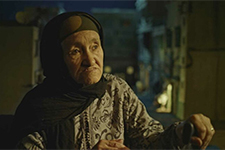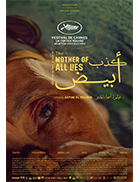The Mother of All Lies (Kadib Abyad)
|  As with her feature debut The Postcard (2020), Asmae El Moudir’s new documentary The Mother of All Lies (Kadib Abyad) uses as its starting place a photograph. In The Postcard, El Moudir used a photograph she found of Zawia, the small Moroccan village where her mother grew up, to explore her mother’s childhood, the village itself, and why she left it. In The Mother of All Lies, one of the film’s primary starting points is a photograph of four children, in the background of which can be glimpsed part of another child who may or may not be El Moudir. This matters because she has no photographs of herself as a child because her stern, controlling grandmother refused to allow any photographs to be taken and none to be displayed in the family home, with the sole exception of a framed photo of the despotic King Hassan II, who ruled Morocco from 1961 to 1999. The ostensible reason for this lack of photography is said to be religious, but by the end of the film we learn that it is for an entirely different reason altogether, one that will likely cause you to view El Moudir’s hard-hearted grandmother, who is otherwise framed entirely as a familial villain, quite differently. The absence of images is central to The Mother of All Lies, a curious organizing tenet of a film that is composed of hundreds of thousands of them. Yet, El Moudir turns that potential weakness into a strength, as she uses the lack of imagery of the history she wants to tell as an excuse to recreate it both physically and rhetorically. She employs her father, who worked his whole life as a handyman, to help her construct an elaborate model of the street she grew up on in the Sebata district of Casablanca and a dollhouse-like model of the apartment building in which she and her family lived. They populate these models with hand-crafted figurines that are rough in their details and yet exquisite in the way they evoke the people after which they have been modeled. Most of those people are invited to the studio where El Moudir and her father have built this elaborate, scale reconstruction of their shared past, which include her mother, her uncle, her neighbors, and her grandmother, who scowls and glares and rebukes everything put in front of her. She rejects the figurine crafted in her likeness, complaining that it has “deformed” her, and she smashes the glass on which an artist draws her portrait. She is often cast in a harsh red light, and when she isn’t directly interacting with someone, she is sitting off in a corner, a hateful, angry presence who comes to stand in for all that goes unsaid and repressed. El Moudir’s goal is to evoke the memories of not just her own childhood through the people she has assembled, but also to draw out long suppressed truths about what happened in Casablanca on June 20, 1981, when more than 600 protestors were gunned down by the military. Known as the “Casablanca Bread Riot of 1981” (so-named because the protests were in response to immense inflation in everyday goods, including bread), this event has long been downplayed in Moroccan history. The events of that bloody day were erased almost immediately, as family members were denied the right to collect the bodies of their loved ones, which were carted off in stacks in military trucks and buried somewhere in mass graves to hide the number of people who were killed (the official government count was somewhere around 60 deaths). The violence unfolded in part on El Moudir’s street, and even though she was born nine years after it happened, the specter of that day lingered in the absence of those who were killed and those were jailed. The winner of both the Best Documentary (L’Œil d’or) award and the Un Certain Regarde Best Director award at the 2023 Cannes Film Festival, The Mother of All Lies is a sharply etched, engaging film that pushes hard on the boundaries of the traditional documentary in favor of a more personal approach that prizes memory and emotion over demonstrable fact. El Moudir’s structure for the film is highly contrived, with the various family members and neighbors being assembled in her studio (which she has referred to as the atelier or “laboratory”) and then shot from elaborate angles and roaming tracking shots with highly stylized lighting that makes the film feel “artistic” rather than “real.” There are many moments in which you can sense the set-up or the recreation, as arguments behind glass walls and far away have perfect sound quality and certain reactions have a performative quality that stretches credulity. Yet, because El Moudir establishes from the outset the fundamental artificiality of the situation she is documenting, the film still has an immense pull that forces us to grapple with not just what has been said and how that relates to verifiable history, but how we construct that thing we call “history” and whether any event, violent or otherwise, can ever be truly known outside of the moment it occurs. Copyright © 2024 James Kendrick Thoughts? E-mail James Kendrick All images copyright © Film Movement |
Overall Rating: 

 (3)
(3)


